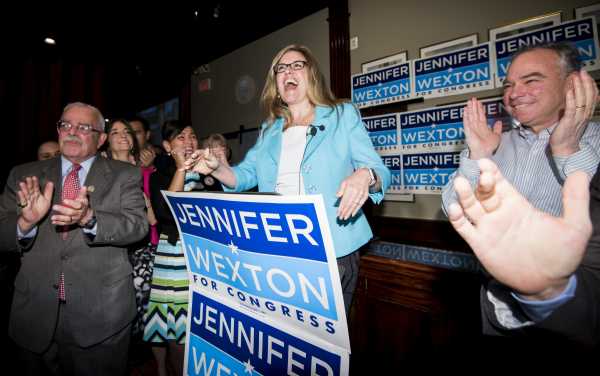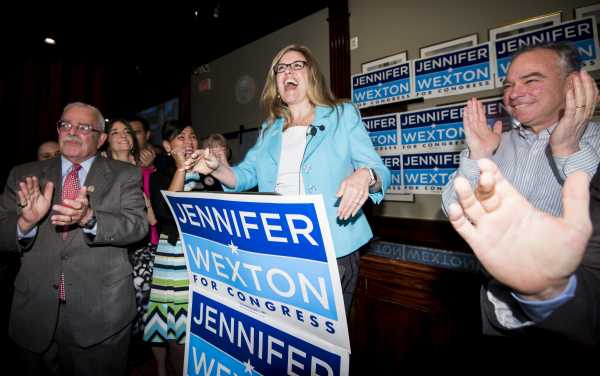
The June 12 primary elections in Virginia, Nevada, Maine, and South Carolina kept many of 2018’s narratives alive and well, with women scoring important wins in Democratic primaries and Trump critics facing the wrath of their Republican base and losing at the ballot box.
Democrats nominated strong candidates for House races in Virginia, where they have a chance to pick up as many as four seats in their bid to retake the chamber, and saw their preferred candidate overwhelmingly approved in the important Nevada Senate race against vulnerable GOP incumbent Dean Heller. Rep. Mark Sanford (R-SC) lost his primary election after President Trump came out against him on election day.
Oh, and Democrats secured another special election win in Wisconsin, having successfully stopped Republican Gov. Scott Walker’s efforts to block the elections from happening at all and then coming out on top in one of the contests on Tuesday.
So without further ado, your four winners and three losers from the June 12 primaries.
Winner: Wisconsin Democrats

After two Republican state lawmakers stepped down to take spots in Walker’s administration, the Wisconsin governor decided to just not call special elections as state law seemed to clearly demand. His lawyers cooked up a farcical literal reading of state law to justify the decision, but Democrats — led by former Attorney General Eric Holder — intervened, the state courts laughed off Walker’s case as absurd, and so the elections were called.
That was the first part of the liberal win, and the second part came on Tuesday, when Democrats prevailed in one of those special legislative elections. Caleb Frostman won in Senate District 1, where Trump beat Hillary Clinton by 17 points in 2016.
That followed the January special Wisconsin Senate election of Democrat Patty Schachtner, who came out on top in a district that Trump had also won by 17 points. Walker said at the time it should be a “wake-up call” for Wisconsin Republicans.
But Tuesday didn’t look much better for Scott or his party in the Badger State. Wisconsin is an important battleground in 2018, after Trump’s unexpected victory there in 2016. Walker is back on the ballot, with Democrats gunning to finally topple him, and Democratic Sen. Tammy Baldwin is seeking her first reelection.
You don’t want to speculate too confidently off special elections, but Democrats in Wisconsin have to feel good about what they’ve seen at the ballot box lately.
Loser: Mark Sanford

If there’s one thing you don’t want to see on election day, it’s a tweet from the president of the United States endorsing your primary challenger. But that’s precisely what happened to Rep. Mark Sanford (R-SC) at 4:12 pm.
State Rep. Katie Arrington ran ads attacking Sanford as a “Washington insider” and heavily hinted at Sanford’s sordid history. He resigned from the governor’s office after coming forward about an affair he had with a woman in Argentina in 2009, all while his staff was telling reporters he was “hiking the Appalachian Trail.” The saying became something of a euphemism afterward.
But Sanford came back to voters in 2012, saying he was reformed, and won a House seat in the state. Perhaps emboldened by his ability to get voters on his side, he became sharply critical of Trump — even telling him to “just shut up” about his critics during the 2016 campaign.
It seems Trump, who has something of a history with alleged affairs of his own, got his revenge: Sanford lost outright to Arrington in Tuesday’s GOP primary.
Winner: Democratic women in Virginia

Virginia is quietly one of the most important states in the race for the House — at least four seats should be competitive in November — and Democrats have now nominated a woman as their candidate in every one of those crucial elections.
In the Virginia Second, they nominated veteran Elaine Luria to challenge Rep. Scott Taylor, In the Seventh, Abigail Spanberger got the nod and is now tasked with toppling Dave Brat, one of the most conservative members of the House. And Jennifer Wexton emerged from a crowded primary and will now face Rep. Barbara Comstock, long considered to be one of the most vulnerable House Republicans in the country, in the 10th.
And prior to primary day, in a local Democratic convention, the party picked Leslie Cockburn in the campaign to replace outgoing and scandal-plagued Republican Rep. Tom Garrett. Each of this races is pegged by election forecasters to be either a toss-up or to lean slightly toward the Republicans. These seats would absolutely be in play in a wave year, especially in a state that is consistently trending bluer all the time.
We’ve seen again and again this year that Democratic primary voters want women to be their candidates. Virginia is maybe the starkest evidence yet.
Winner: Medicaid
On the heels of Virginia becoming the first state to expand Medicaid under the Trump administration, Wexton won the Democratic primary in the Virginia 10th and is expected to tout her vote in the state Senate to expand the program in her general election campaign against Comstock. How far we’ve come, when Obamacare and Medicaid can be electoral advantages for Democrats.
In Maine, while we can’t be certain just yet, state Attorney General Janet Mills looks to be in a strong position to win the Democratic gubernatorial nomination — she, too, ran on a strong pro-Medicaid expansion message. While Maine’s Republican Gov. Paul LePage has blocked it for the better part of a year after voters approved a ballot initiative to expand Medicaid, a Mills win in November would probably finish the job, if the courts don’t sooner.
One other bit of good news for Medicaid, even if it wasn’t on the ballot: Nebraska organizers said this week they were optimistic they would secure the signatures they need to put up expansion in a ballot referendum in November. That would make three states — in addition to Idaho and Utah, where Medicaid expansion will definitely be on the ballot — that might take a big step toward extending health coverage to poor residents this year.
Loser: Sen. Dean Heller (R-NV)

I mean, technically, Heller won his Republican primary, but only after getting embarrassed by Trump last year, then cozying up to the president, who finally urged a credible conservative challenger to drop a primary bid against Heller.
Heller might feel good about that, but the overwhelming victory for Rep. Jacky Rosen, a freshman in Congress with very little statewide name recognition, in the Democratic primary probably doesn’t bode well for what was already going to be a very tough race for Heller. They were already polling neck and neck before Rosen officially won her nomination.
Heller, first appointed in 2011, has a lot of reasons to be worried. He is the only incumbent Republican senator up for reelection in a state that Hillary Clinton won in 2016. Even in a pretty dismal national environment, the Harry Reid-powered Nevada Democratic machine helped push Catherine Cortez Masto to a win in the 2016 Senate election.
Heller hasn’t covered himself in glory on Capitol Hill either, initially throwing in his lot with popular Republican Gov. Brian Sandoval on Obamacare repeal (refusing to support anything that the good governor didn’t support, like the first Senate bill) but then shifting gears and putting his name on a plan that would lead to millions fewer Americans having health insurance.
Now he’s officially got Rosen, in the year of the Democratic women, as a challenger. It’s probably not going to get any easier from here.
Loser: ranked-choice voting
Honestly, ranked-choice voting seems like a pretty good idea — read the full explainer from Vox’s Ella Nilsen — because it actually creates more consensus than a winner-take-all election.
But we have to rate it a loser after Maine Gov. LePage bluntly stated he probably wouldn’t certify the results of his state’s primary election because he thinks ranked voting is “the most horrific thing in the world.” Maine is so far the first state to attempt to institute ranked-choice voting for statewide elections.
From the looks of it, the ranked system will be needed in the Democratic gubernatorial primary, where Mills leads but doesn’t have a majority among primary voters. But first, we might have to wait to make sure LePage’s stunt doesn’t trip things up (the Maine secretary of state said his role was purely “ceremonial,” for what it’s worth).
Ranked-choice voting could very well win in the end, and Maine voters appear to have reaffirmed Tuesday night that they wanted to keep it. But thanks to LePage making a bit of a mess, it’s a loss.
Winners: ridiculous Senate candidates
Republican Eric Brakey almost certainly isn’t going to beat Sen. Angus King (I-ME) in November, but he did win the GOP primary, and that was occasion enough for his previous life as a viral video star to resurface on Twitter.
On a more serious note — but with an equally slim chance of changing the expected outcome in November — Corey Stewart won the Republican Senate nomination in Virginia, and he will challenge Sen. Tim Kaine in November. Corey Stewart, who has had to repeatedly disavowed his prior friendliness with white supremacists. Corey Stewart, who doesn’t think black people really want Confederate monuments taken down. That Corey Stewart.
This is what a former Republican lieutenant governor had to say about Stewart’s nomination.
Yikes.
Sourse: vox.com






